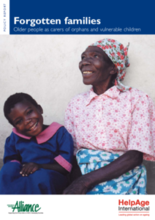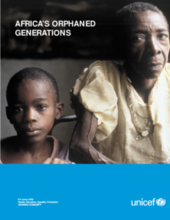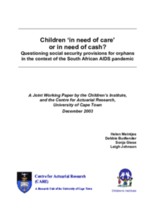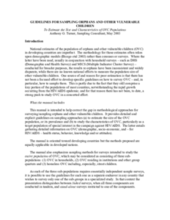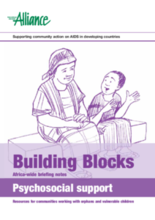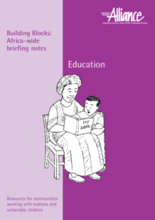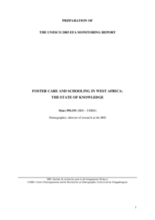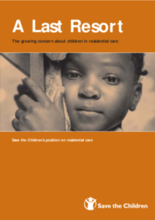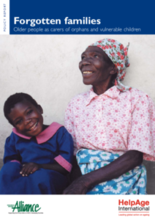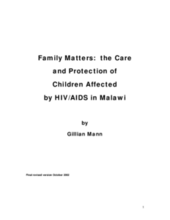Displaying 381 - 390 of 414
A publication by International AIDS Alliance and HelpAge International provides an overview of the issues identified by older people and orphans and vulnerable children themselves; examples of community-based programs that are improving the lives of older people and orphans and vulnerable children; recommendations that will help to prioritize orphans and their carers within HIV/AIDS and wider development policies, programs and research.
Current statistics and projections of HIV prevalence and impact on children and families in Sub-Saharan Africa. Outlines a strategy for action which includes collaborative efforts on the part of governments and child-focused agencies to strengthen families, build community capacity and increase awareness.
Research study of the current social security provisions for orphans in South Africa, with a comparison of four alternative cash grant scenarios. Recommends a universal income support system for all children in need.
A manual which seeks to fill the gap in the methods of estimating the population of orphans and vulnerable children in developing countries. The manual includes thorough guidelines on sampling approaches.
Outlines the psychosocial impacts of HIV/AIDS on children and suggests principles and activities to strengthen psychosocial support. Includes a brief list of follow-up resources.
Outlines the impact of HIV/AIDS on children’s education and suggests strategies for meeting children’s educational needs. Includes a list of follow-up resources.
Explores the relationship between fostering and education in West Africa. Identifies special need to focus on protecting and educating young girls.
This paper outlines the International Save the Children Alliance’s position on residential care. It addresses the proliferation of residential care, its negative impact on children and the need for international attention. The paper presents the work of Save the Children and other agencies in order to highlight relevent issues and to provide a guide for those working with separated children.
A brief policy report which highlights issues faced by older caregivers of orphans and vulnerable children in Africa. Outlines NGO responses, challenges and recommendations for programmatic support of older caregivers. Includes statistical data on ageing, HIV/AIDS and kinship care in Africa.
This paper describes a qualitative research study conducted in three villages in Malawi. It explores community mobilization and kinship care, as well as striking discrepancies between the perceptions of adults and children regarding care and support. The paper advocates for increased child decision-making, childcare protection policy, and support networks for orphaned children.

